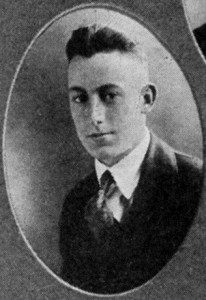Milman Parry ’19

It is hard to exaggerate the importance of Milman Parry (1902-1935) in 20th century classics scholarship. He completely changed the field of Homeric Studies (the study of the ancient Greek epic poet Homer), so much so that Parry’s influence is still relevant today. The anthropological approach that he pioneered permitted him to reflect in a new way on a very old problem, one rooted in late antiquity. The so-called “Homeric question” asks whether Homer actually existed and if he did, what role he played in the composition of the Iliad and the Odyssey.
Recording and studying traditional songs in the Balkans in the 1930’s, Parry was able to recognize signs of oral poetry in the two ancient epics. This suggested that for a long time, well before ever having been written down, the Iliad and the Odyssey were sung and as oral poetry, would therefore have been changed or “recreated” during each performance.
This realization launched Parry’s brilliant academic career and quickly brought him to an eminent position. Those of us in the field wonder to this day what he might have done, if he had only had more time, which amazing papers and books he might have written. We can only imagine. After studying at Oakland Technical High School (Class of 1919), where he first learned Latin and possibly became interested in the classics, Parry graduated from UC Berkeley and then earned a PhD at the Sorbonne in Paris where he worked with the famous scholar Antoine Meillet.
Parry taught at Harvard University until he met a tragic death when he was only 33 years old. Reports at the time said that he was accidentally killed by a shotgun in a hotel room in Los Angeles. An ancient Greek poet wrote: “He whom the gods love, dies young.” The gods must have loved Milman Parry a lot, if they gave him such a short time and such a great talent. He left many papers and a son, Adam, who published them in a volume in 1971. At the time of his death, Parry was just establishing a reputation in his field, but today his work is considered to be the turning point of Homeric Studies in the 20th century.
No one who approaches the study of Homer today can ignore the contributions of Milman Parry.
(Contributed by Marco Gemin, PhD student at Università di Roma “Tor Vergata,” Italy, Visiting student researcher at UC Berkeley in 2014.)
